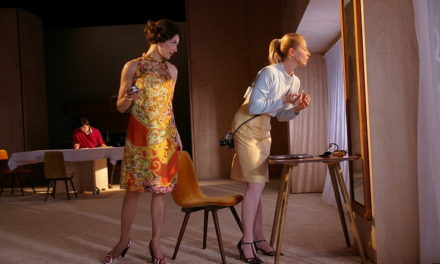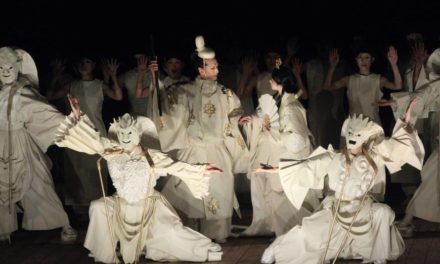undercurrents Festival Director Patrick Gauthier and Associate Director Brit Johnston have discussed openly their curatorial strategy for this year, one which stems from an urgent problem: mid-winter Ottawa begs for joy. The city has resigned itself to being stuck squeezing as much life as possible from short, frigid days. In programming undercurrents 2020, Gauthier and Johnston have searched Canada for beacons of theatrical joy, even if the performances fit that moniker in ways that defy convention.
Such is the case with Paul David Power’s Crippled, an emotional snapshot of the intersect between disability, grief, and suicide. Our joy comes from cathartic relief, and indeed, from the privilege that is being able to experience well-performed new work from otherwise-under-platformed voices. Power has a gift for emotional resonance (one that mitigates Crippled’s somewhat fragmented structure); he guides us through his emotional journey in a way that is both deeply personal yet painfully disconnected – an inner storm that only unfillable loss can facilitate.
Crippled follows Tony, a disabled writer at the watery edge of St. John’s, through the reconciliation of unfortunate past and uncertain future. The appearance of a would-be stranger, Evan, confronts Tony with the ultimate choice: suicide or the continuation of life at the margins of the gay scene in Newfoundland. In a not-particularly-revealing turn of events (one that calls strongly to Katori Hall’s The Mountaintop), it’s revealed that Evan is not who he introduces himself to be. We follow the ghost of an evidently-in-love couple through the joys of domesticity into anxiety-spiking crisis as Tony’s partner suffers a medical emergency – one that Tony is unable to ameliorate due to his own condition.
It’s a tough story. Crippled does not directly ask for our pity; it doesn’t have to, instead coaxing out sympathy through the precise execution of Power’s writing. Crippled struggles somewhat in its pacing, even calling attention to its tricky ending directly by means of direct address to the audience; I’m not quite sure its problems in structure are solved by simply acknowledging that they’re there. This tactic of direct address is one that, in another show, might be used to further get us on Power’s side. We’re there, though, the whole way through, and Power’s presence onstage is vibrant and somehow conversational enough even without this dramaturgical choice.
Crippled is a vehicle for a good cry and, more importantly, a look into how we as a community can best showcase underrepresented groups onstage. Paul David Power has created a dark horse of a play, one that challenges its able-bodied voyeurs to (in his own words) not be assholes. Moments in Crippled are objectively funny, and despite the dark subject matter, there’s an underlying hope to the piece that speaks to a coming spring in the city of Ottawa (both literally and, more metaphorically, in our ever-evolving theatre scene). Power’s choices within Crippled speak to an artist that is capable of writing and performing beyond his disability; I found myself wishing to know more about Tony’s tastes and life beyond visible disability.
undercurrents has made the right call in presenting this show; for many, it will be a lingering first look into what theatre can be beyond the able-bodied and heteronormative status quo. Paul David Power and his collaborators have created a transcendent, relatable play that speaks to a difficult reality for disabled Canadians; despite struggle in dramatic structure, this piece will undoubtedly remain a talking point in the community for several winters to come.
This article was originally posted at capitalcriticscircle.com on February 11, 2020, and has been reposted with permission. To read the original article, click here.
This post was written by the author in their personal capacity.The opinions expressed in this article are the author’s own and do not reflect the view of The Theatre Times, their staff or collaborators.
This post was written by Aisling Murphy.
The views expressed here belong to the author and do not necessarily reflect our views and opinions.


















